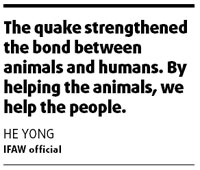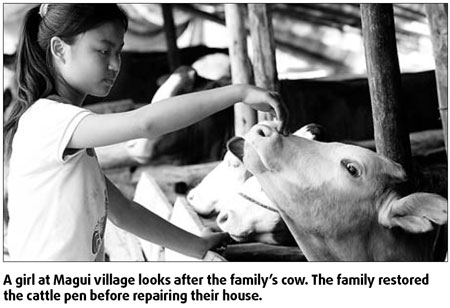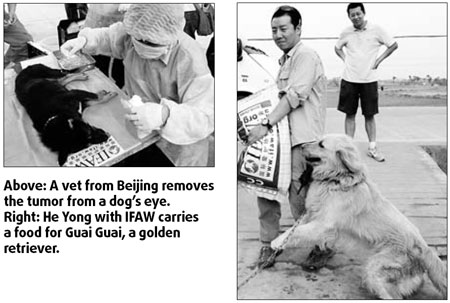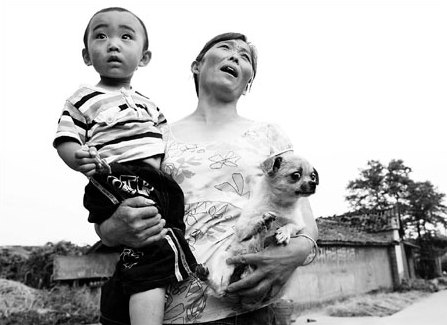A dog-day afternoon
|
A woman carries a dog to get vaccination. The dog ran to her home in Zundao town of Mianzhu city after the earthquake. Photos courtesy of IFAW |
A group of aid workers pick their way through fields of rubble in the quake-devastated town of Zundao in Mianzhu city. They have a challenging mission in Sichuan, but it's quite different than many of the other relief efforts taking place in the province post-May 12.
The volunteers with the International Fund for Animal Welfare (IFAW) are here, not only to help the people, but also their dogs.
The animal experts, who hail mainly from Beijing, Austria and the United States, troll the area with sacks of dog food to help dog owners, who have been scrambling for food since the quake, feed their dogs.

At first, the locals, who traditionally feed their dogs leftover dinner scraps, had a hard time believing the big bags of nibble were made specifically for dogs. But, once the doubt wore off, the locals welcomed the efforts of the aid group.
"Someone told me dog food was a great idea since his dog normally eats as much as three or four people do," says He Yong, assistant to IFAW's Asian regional director.
IFAW has provided 1 million yuan ($143,000) worth of human and animal supplies to help quake-hit areas. Besides distributing power engines, cooking oil, detergents and other necessities for local people, the team has also provided veterinary care to animals in distress. They also gave anti-rabies vaccinations to some 1,000 dogs running wild after the quake.
"By helping the animals, we help the people," He says. "The quake strengthened the bond between animals and humans."
But, because unvaccinated dogs pose a serious threat to people, some local governments ordered stray dogs be put down.
Locals, who were afraid of losing their furry pets, lined up to have their dogs immunized when the IFAW team showed up. Initially, owners were scared to admit their dogs were not vaccinated for fear of losing them. The owners would lie and turn the animal experts away. He said he found the honest mistake heart-warming.
"You can tell the care and love for their animals is a deep and natural emotion," He says.
IFAW, which advocates humane care for animals, uses pain-minimizing equipment to trap, anesthetize and euthanize hostile stray dogs. The imported equipment, particularly the blowpipe and baited cages, elicited much curiosity from the locals, who had never seen such technology before.
The scientific methods used by IFAW are important because they reflect a humanitarian concern for the animals, says He. That's why animal experts gave local veterinarians training on how to use such methods.
A young local vet told He it had never before occurred to her there was an ethical dimension to veterinary medicine.
"She told me it was a revelation. She used to think of herself as a technician, doing only what she was told," he says.
"A human doctor's purpose is to alleviate human suffering and save lives, and veterinarians do the same for animals," says He. "That single idea was communicated perfectly - and bonded us with the local veterinarians."
Zhou Lebing, head of the local veterinarian association, said he was impressed by the expert team's professionalism and tolerance to filth.
"It was hard, dirty work, but their hearts and souls were into it," said Zhou.
As hard as they worked, the project would have been impossible without local government support, said volunteer Liu Lang, a veterinarian from the Beijing Small Animal Veterinary Association.
Liu said the government's recent decision to end the culling of stray dogs was particularly wise for the children. Liu said having them watch animals being killed would have further harmed their young psyche already left vulnerable from the quake.
"In a way, their endorsement of our project made people feel that the government took responsibility to help not only humans, but also animals," said Liu.
He also agreed the open cooperation of the local government was an important factor to the success of IFAW in the area.
"Everyday, they sent two local veterinarians who combed the villages with us, to vaccinate the dogs and distribute food door-to-door," said He.
The IFAW program has also been supported outside of local government, He says. Beijing has been supportive and He says he hasn't had a problem recruiting volunteers.
"After the disaster struck, many people came to us wanting to help. We didn't have to advertise. People were ready."
Zhou was most grateful for the help from Beijing.
"I hope they visit again soon," Zhou said. "We still need cages, equipment for euthanasia, antibiotics and motorcycles."
"If they need us, I and other Beijing veterinarians are prepared to return there anytime," said Liu.


(China Daily 06/23/2008 page8)















